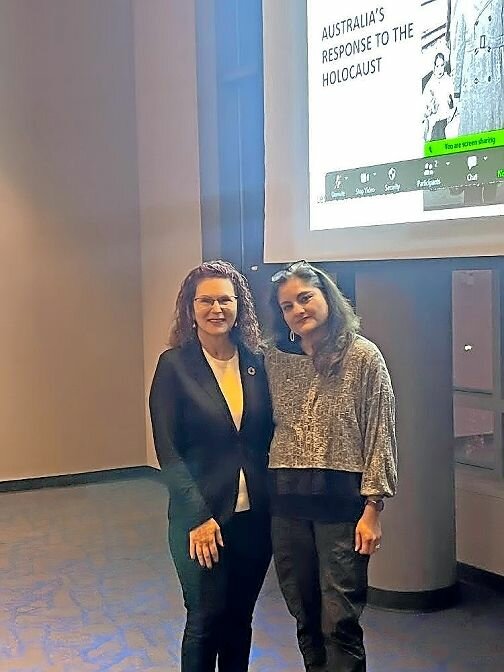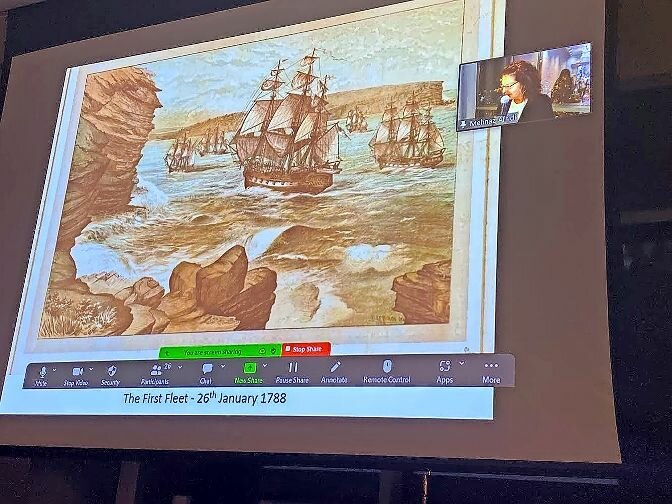Australia was a Jewish sanctuary following WWII
Suzanne Hampel, head of Melbourne Holocaust museum, describes how 'down under' was a safe place
Of all the places in the world affected by the Holocaust of Jews during World War II by the Germans, Australia usually doesn’t come to the top of the list.
That is one of the reasons Manhattan College’s Holocaust Genocide and Interfaith Education Center invited the daughter of a holocaust survivor to speak to students Monday about Australia’s response to the Holocaust.
Suzanne Hampel, co-president of the Melbourne Holocaust Museum in Australia and the daughter of a Holocaust survivor, spoke on Australia’s long history of accepting Jewish migrants to its shores. According to Hampel, Australia had received the most Holocaust survivors over time. She spoke about how that shaped the Jewish Australian communities.
“I figured that the Americans don’t know very much about Australia, even when Jews first came to Australia,” Hampel said. “So, I thought by highlighting vignettes or little episodes, that maybe someone would remember one story like the William Cooper indigenous man story, that would encourage them to go and learn more about Australian history, Australian stories or something like that. I thought I’d try something that most people probably don’t know about.”
The event, which was held both virtually and in person, drew a much larger audience than anticipated.
“We really have to learn from the past to safeguard the future and to learn those lessons hard from the past, to save the world,” Hampel said. “You look at history and it repeats, we haven’t been learning the lessons from the past. But hopefully tonight I gave the community a bit of an insight into a little bit of the life in Australia.”
Hampel teaches about the past in order to build a more tolerant future. She teaches at Melbourne’s Monarch University and is a researcher for the Austrailian Holocaust Memorial Project at the Austrailian Centre for Jewish Civilisation. She is also the co-author of the essay “Conceptualizing Mass Violence, Representations, Recollections, and Reinterpretations.”
“I also very much have a lot of respect for her work,” said Mehnaz Afridi, director of the Holocaust, Genocide and Interfaith Education Center. “I think that in the United States, our field of Holocaust Studies is overshadowed by Europe in a way that we don’t think about other continents and countries that were implicated in terms of immigrants.”
With more than 35 audience members, many students and some faculty members decided to go to the event. Some students went because of faculty recommendations. Some said they surely left the lecture with more knowledge about the Holocaust’s effects on Australia than they came in with.
“I was interested in learning more about history and applying it to the current issues that are currently happening,” Manhattan College sophomore Kineret Ortega said. “The talk was very interesting, and [Hampel] was very informative. I enjoyed the question segment at the end, it was very enlightening. I feel like there were a lot of stories to relate to and understand from.
“My biggest takeaway was definitely the time period in history. Learning about what exactly happened and the events that happened during that time.”
Assistant to the director of HGI, Christopher Belden, a senior, believes that events and lectures that the HGI hosts are important and beneficial to students as well as the community.
“The audience not only learns how to communicate across cultures and religions and whatnot, but they really get to see through the propaganda and how governments, in particular, tie in other specific individuals or communities and through the events HGI programs hosts,” Belden said. “It helps create a better-informed community for everybody.”









